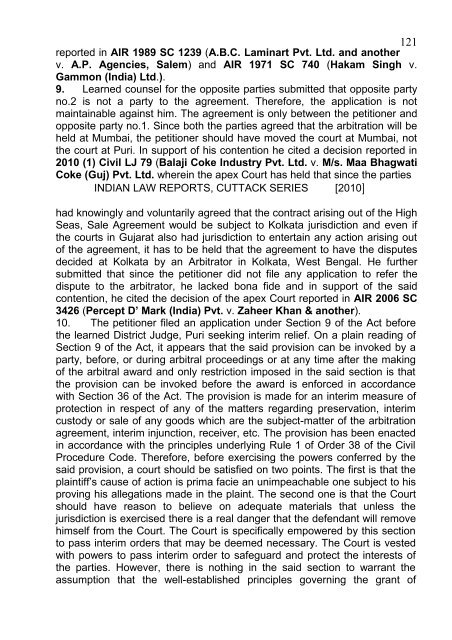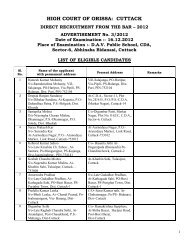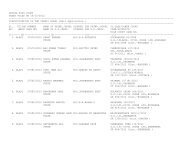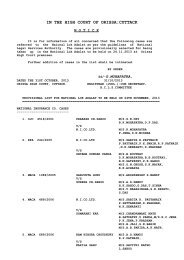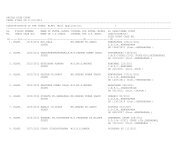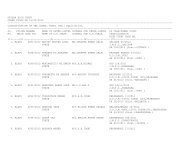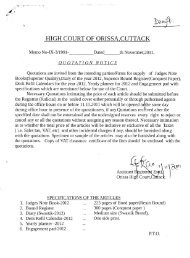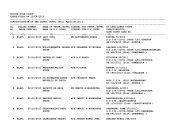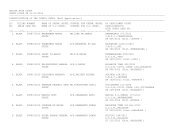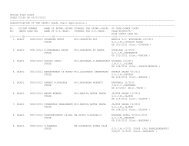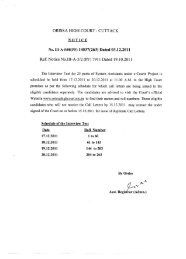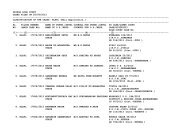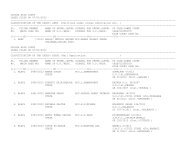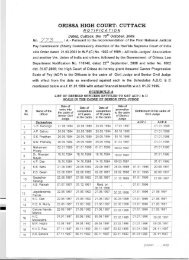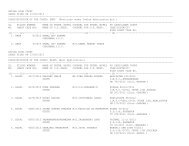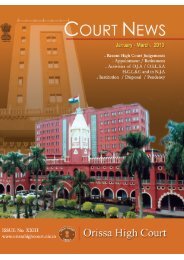ORIGINAL JURISDICTION - Orissa High Court
ORIGINAL JURISDICTION - Orissa High Court
ORIGINAL JURISDICTION - Orissa High Court
Create successful ePaper yourself
Turn your PDF publications into a flip-book with our unique Google optimized e-Paper software.
121<br />
reported in AIR 1989 SC 1239 (A.B.C. Laminart Pvt. Ltd. and another<br />
v. A.P. Agencies, Salem) and AIR 1971 SC 740 (Hakam Singh v.<br />
Gammon (India) Ltd.).<br />
9. Learned counsel for the opposite parties submitted that opposite party<br />
no.2 is not a party to the agreement. Therefore, the application is not<br />
maintainable against him. The agreement is only between the petitioner and<br />
opposite party no.1. Since both the parties agreed that the arbitration will be<br />
held at Mumbai, the petitioner should have moved the court at Mumbai, not<br />
the court at Puri. In support of his contention he cited a decision reported in<br />
2010 (1) Civil LJ 79 (Balaji Coke Industry Pvt. Ltd. v. M/s. Maa Bhagwati<br />
Coke (Guj) Pvt. Ltd. wherein the apex <strong>Court</strong> has held that since the parties<br />
INDIAN LAW REPORTS, CUTTACK SERIES [2010]<br />
had knowingly and voluntarily agreed that the contract arising out of the <strong>High</strong><br />
Seas, Sale Agreement would be subject to Kolkata jurisdiction and even if<br />
the courts in Gujarat also had jurisdiction to entertain any action arising out<br />
of the agreement, it has to be held that the agreement to have the disputes<br />
decided at Kolkata by an Arbitrator in Kolkata, West Bengal. He further<br />
submitted that since the petitioner did not file any application to refer the<br />
dispute to the arbitrator, he lacked bona fide and in support of the said<br />
contention, he cited the decision of the apex <strong>Court</strong> reported in AIR 2006 SC<br />
3426 (Percept D’ Mark (India) Pvt. v. Zaheer Khan & another).<br />
10. The petitioner filed an application under Section 9 of the Act before<br />
the learned District Judge, Puri seeking interim relief. On a plain reading of<br />
Section 9 of the Act, it appears that the said provision can be invoked by a<br />
party, before, or during arbitral proceedings or at any time after the making<br />
of the arbitral award and only restriction imposed in the said section is that<br />
the provision can be invoked before the award is enforced in accordance<br />
with Section 36 of the Act. The provision is made for an interim measure of<br />
protection in respect of any of the matters regarding preservation, interim<br />
custody or sale of any goods which are the subject-matter of the arbitration<br />
agreement, interim injunction, receiver, etc. The provision has been enacted<br />
in accordance with the principles underlying Rule 1 of Order 38 of the Civil<br />
Procedure Code. Therefore, before exercising the powers conferred by the<br />
said provision, a court should be satisfied on two points. The first is that the<br />
plaintiff’s cause of action is prima facie an unimpeachable one subject to his<br />
proving his allegations made in the plaint. The second one is that the <strong>Court</strong><br />
should have reason to believe on adequate materials that unless the<br />
jurisdiction is exercised there is a real danger that the defendant will remove<br />
himself from the <strong>Court</strong>. The <strong>Court</strong> is specifically empowered by this section<br />
to pass interim orders that may be deemed necessary. The <strong>Court</strong> is vested<br />
with powers to pass interim order to safeguard and protect the interests of<br />
the parties. However, there is nothing in the said section to warrant the<br />
assumption that the well-established principles governing the grant of


